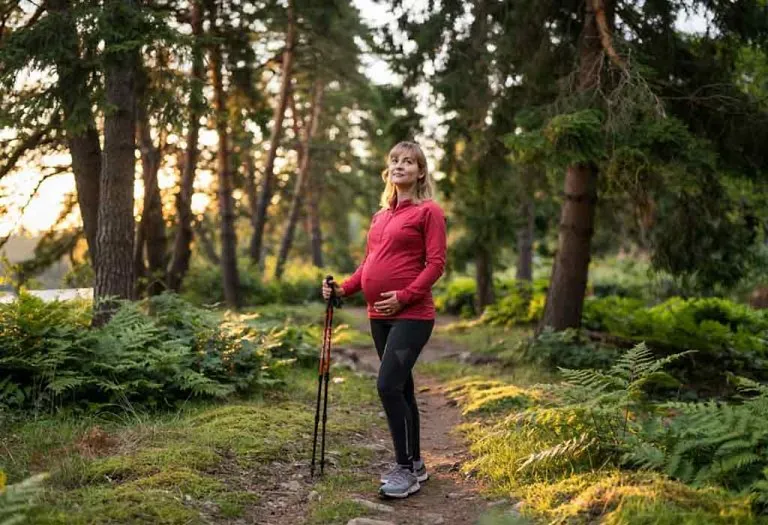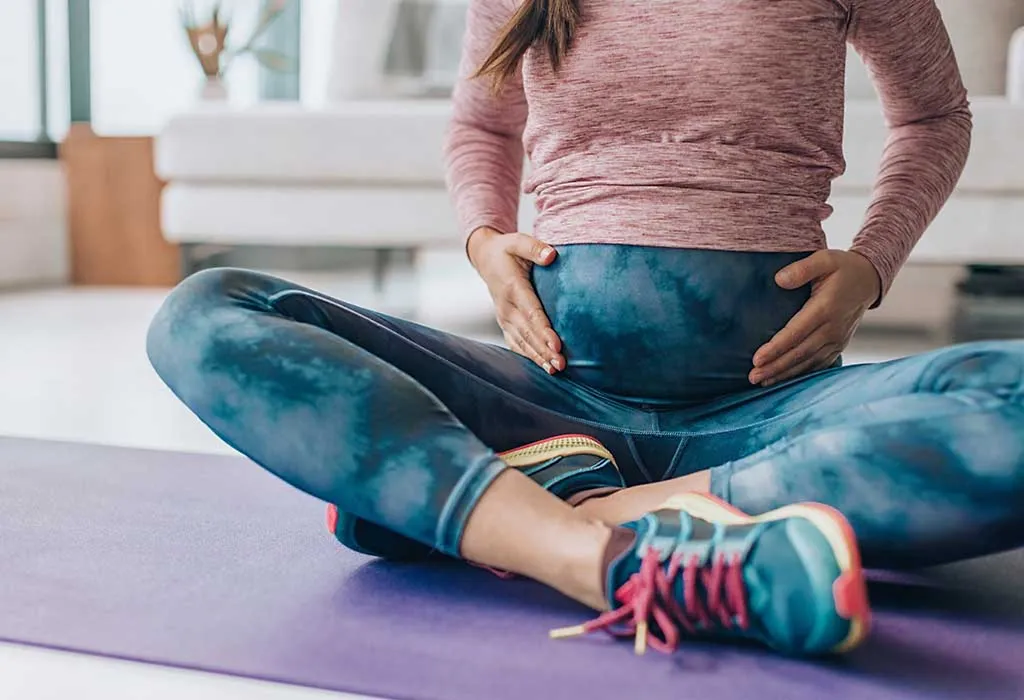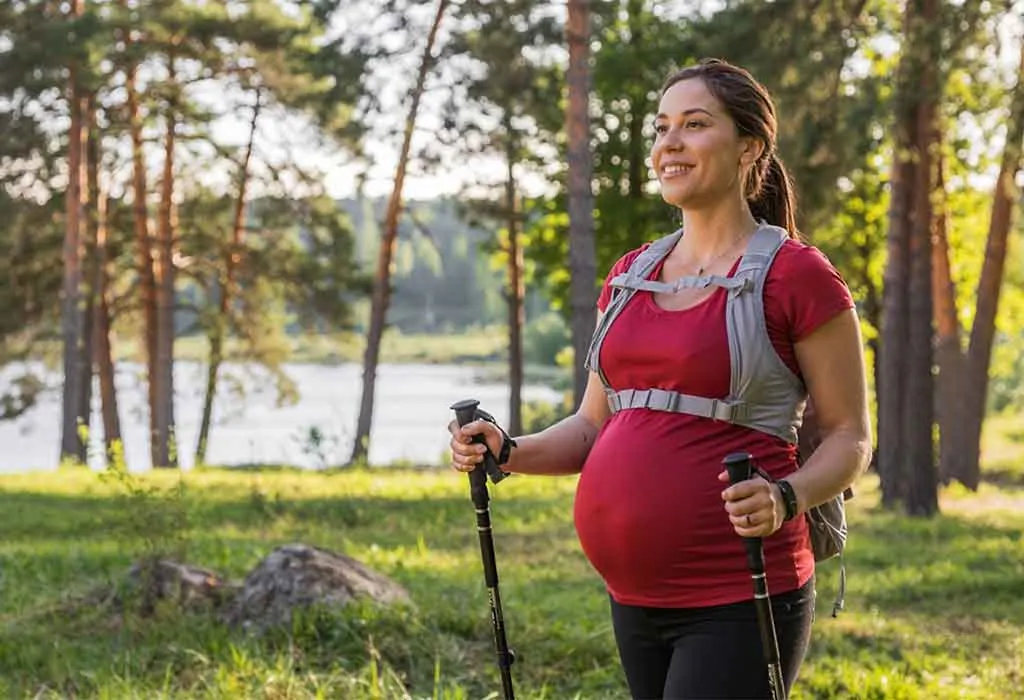Hiking During Pregnancy – Benefits and Precautions
Exercise and mobility are essential things recommended during pregnancy, unless there is a medical reason to avoid them. If you’re an adventurous person, you may wonder whether it’s safe to go hiking during pregnancy. Hiking is a great physical activity that offers excellent cardio and challenges an individual’s stamina and skill. However, as pregnancy is a delicate phase, extra care needs to be taken, so it is essential to consider whether hiking and pregnancy are compatible. The good news is that hiking in moderation during pregnancy is generally considered safe, provided you follow a few key health and safety measures. Read on to learn when you should begin and stop hiking in pregnancy and what precautions you should take before this physical activity.
Is It Safe to Hike While Pregnant?
Yes, it is safe to hike during pregnancy as long as you follow the necessary precautions and know when to give your body the required rest. Staying active during pregnancy is a great way of ensuring better sleep, good cardiovascular health, reduced stress and anxiety, and a lower risk of pregnancy complications (1).
However, to ensure the maternal and fetal safety, it is recommended to know the limits of strenuous physical activity during pregnancy and consult your doctor before starting any exercise regimen, including hiking. Your doctor may recommend a suitable fitness regimen or advise against certain activities based on your pregnancy progress.
When Should You Begin Hiking During Pregnancy?
Some of the common questions related to hiking during pregnancy are ‘Is hiking in early pregnancy safe?’ ‘Is hiking during the first trimester or second trimester safe?’ Typically, you can begin hiking during pregnancy once your doctor approves it. However, it’s crucial to pay attention to your body and take things slow, particularly during the first trimester when your body is adapting to the changes of pregnancy. The first trimester, until 12 weeks, is a highly delicate time, so strenuous activities should be avoided during this period. As your pregnancy progresses, it may be necessary to modify the intensity and duration of your hikes according to your comfort.
Benefits of Hiking During Pregnancy
Hiking during pregnancy is beneficial for pregnant women. Here are some benefits:
1. Good Cardiovascular Health
Hiking can improve an individual’s cardiovascular health, strengthening the heart and lungs. Hiking during pregnancy can make it easier for pregnant women to handle the physical demands of pregnancy as well as childbirth (2).
2. Good Sleep Quality
Regular moderate exercise, such as hiking, can improve sleep quality and duration, which can be disturbed during pregnancy due to various factors, including backache or vomiting (3).
3. Enhanced Mood and Reduced Stress
Nature is one of the best mood enhancers. Moreover, endorphins released during fitness activities can boost energy and mood levels positively, making you feel more positive and happier (4). Thus, spending time in nature, hiking, can help elevate the mood and reduce stress and anxiety levels during pregnancy (5).
4. Strengthens Bonding
Hiking is a great way to detox from social media and spend more time with nature and your baby.
5. Lower Chances of Complications
According to a 2016 study published in the Wilderness & Environmental Medicine, pregnant women who actively participated in outdoor sports and travelled to high altitudes experienced a low rate of pregnancy complications. However, further research is needed on the risk associated with high-altitude travel (1).
Tips for Hiking When Pregnant
If you are a hiking enthusiast, you would not want to miss this time to go on a quick hike. Once you receive a green signal from your doctor regarding hiking during your pregnancy, you can plan for one with these essential tips in mind:
1. Start the Hike Slowly
Hiking is not a race; it’s about enjoying nature and the beautiful trails nature offers. When planning a hike during pregnancy, ensure you plan the journey carefully, including where to start and when to begin, and start slowly. Take frequent breaks to prevent your body from overheating. Increased basal body temperature during pregnancy can lead to pregnancy complications. Give your body enough rest to enjoy the journey.
2. Stay Hydrated
Remember to stay hydrated at all times while hiking to compensate for the salt losses in sweat. Dehydration is a common occurrence during any physical activity, and maternal hydration status during pregnancy significantly impacts both the health of the fetus and the mother (6). Staying hydrated is crucial for the mother to maintain normal physiological functions, including the formation of amniotic fluid, the transport of nutrients to the baby, and regular bowel movements. Cutting down on salt and caffeine intake before hiking will also help your body utilise bodily fluids more effectively and urinate less.
3. Wear the Correct Outfit
Comfortable and activity-specific clothing ensures maximum comfort while hiking. Choose hiking clothes that are light, breathable, and have moisture-wicking properties. Complete the dress up with supportive footwear to ensure a stable grip on the ground while hiking and prevent slipping or any kind of imbalance.
4. Plan the Right Terrain
Now that you are pregnant, your safety becomes the utmost priority. As much as you’ll be tempted to hike up your bucket list trails, it’s best to listen to your body’s needs now and choose the right terrain for your hike wisely. You may experience fatigue and dizziness; thus, hiking on a paved or flat trail is wise. Carry hiking poles and wear protective gear to maintain balance while hiking. Regardless of your level of experience as a hiker, choose a trail that is comfortable for your current situation.
5. Carry a Cell Phone or Any Other Communication Device
Whether you’re going to hike alone, with your partner, or with friends, keep your communication device, such as your phone, charged. Most importantly, inform your family about where you’re going for hiking and for how long. Turn on your GPS and share your live tracking so that your family can reach you in times of emergency, and install a trail navigation app so you don’t deviate from the route.
6. Carry Pee Rags
Bathroom breaks are common in pregnancy. Keep pee rags and panty liners to help with frequent bathroom breaks.
7. Stretch Before You Start
Stretching is essential before any physical activity, and especially before hiking. As hiking can be strenuous, it’s essential to have a well-stretched body. Take some deep breaths, roll your ankles, and lightly stretch your muscles with a cat-cow pose before and after the hike to release the tension in your muscles.
8. Hike With Your Partner or Friends
Ask your partner, friends, or family to join you for the hike. This will strengthen the bond and provide you with safety and care while hiking. Plus, the extra person will help you share the load of things you take on hike and be there in case of an emergency.
9. Prepare the Hiking Kit
Hiking, especially during pregnancy, should be planned well. Before hiking, learn about your surroundings, including the flora and fauna, animal presence, and weather conditions. Keep your medications, snacks, fluids, first-aid kit, clothes, sunscreen, and other essentials well packed according to the duration of your hike. Snacks like homemade protein bars, bananas, nut butters, and homemade granola are healthy snacking options. Don’t carry extra weight while hiking. Prefer hiking during pregnancy in areas with good human presence and transportation facilities, rather than in abandoned areas.
10. Know Your Medical Status
Before finalising your hike, consult your doctor about it. Every pregnancy is unique, with its own medical history, risks, and potential complications. Thus, consulting your doctor and finalising the terrain difficulty is ideal.
Precautions for Safe Hiking During Pregnancy
Although hiking while pregnant is generally safe, certain precautions should be taken to ensure both maternal and fetal safety. Here are some of those:
- Do not overexert yourself or push too hard to complete the hike. Listen to your body cues and take a rest when you feel like.
- Stay hydrated at all times by consuming plenty of water and healthy snacks.
- Avoid going on hikes in extreme weather conditions, including extremely hot or cold temperatures.
- Be alert and patient while hiking. Avoid treacherous paths and potential hazards, such as slippery rocks or cliff edges.
FAQs
1. Can excess hiking cause health issues during pregnancy?
Excess hiking during pregnancy can potentially cause maternal health issues, especially if you fail to take necessary safety precautions or overexert while hiking. Pushing yourself too hard while hiking can increase the risk of fatigue, dehydration, and injury. Plus, hiking in extreme weather conditions can be dangerous for both the mother and the baby.
2. Is hiking in the second or third trimester safe?
Hiking during the second trimester is generally considered safe, but it depends on the pregnancy’s progress, maternal health, and the likelihood of complications. Hiking in the third trimester may be difficult for some.
3. What should you pack for hiking when pregnant?
Supportive footwear, comfortable clothing, a lightweight insulated water bottle, trekking poles, snacks, communication devices (such as a phone or wireless device), a maternity support belt, and first aid are some essential items to have while hiking when pregnant.
4. When should you consult a doctor?
If you experience any of the unusual symptoms like abdominal pain, contractions, or vaginal bleeding, stop the hike immediately and visit the nearest doctor. Before going on a hike, we suggest consulting your doctor to determine if it’s a good idea for you.
As much as you love hiking, consulting a doctor for approval based on your pregnancy’s progress is a wise thing to do during pregnancy for the sake of your baby’s health and your own. If you are an amateur, consider delaying hiking as an incorrect step while hiking with a baby on the tow can be serious. Thus, listen to your body, stay hydrated at all times, take as many breaks as you need, and don’t push yourself too hard because the priority is safety, health, and the upcoming baby.
References/Resources:
1. PubMed – Outdoor Activity and High Altitude Exposure During Pregnancy: A Survey of 459 Pregnancies
4. PubMed Central – Role of Physical Activity on Mental Health and Well-Being: A Review
Also Read:
Travelling during Pregnancy
Running while Pregnant
Butterfly Exercise in Pregnancy
Jumping While Pregnant – Is It Harmful?
Was This Article Helpful?
Parenting is a huge responsibility, for you as a caregiver, but also for us as a parenting content platform. We understand that and take our responsibility of creating credible content seriously. FirstCry Parenting articles are written and published only after extensive research using factually sound references to deliver quality content that is accurate, validated by experts, and completely reliable. To understand how we go about creating content that is credible, read our editorial policy here.





































